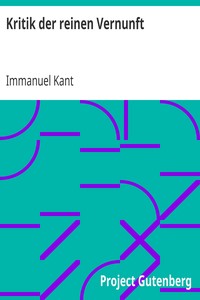Kritik der reinen Vernunft by Immanuel Kant
"Kritik der reinen Vernunft" by Immanuel Kant is a foundational philosophical work written in the late 18th century. This critical examination aims to analyze the relationship between human experience and knowledge, particularly addressing the capabilities and limits of pure reason. Kant explores the means through which knowledge is acquired, distinguishing between different forms of judgment and the implications they hold for metaphysics and epistemology. The opening of this work sets the stage
for Kant's ambitious project. Kant introduces the notion that human reason encounters insurmountable questions within metaphysics but fails to find satisfactory answers to them. He discusses the importance of understanding how we arrive at knowledge - especially knowledge that is independent of empirical experience (a priori). In this context, he presents the difference between analytical and synthetic judgments, emphasizing the need for a critique of pure reason to delineate the sources, extent, and validity of our knowledge. This introductory analysis is essential for understanding the broader inquiries that Kant will undertake in subsequent sections regarding the foundations of human understanding and the frameworks of reality that govern our experiences. (This is an automatically generated summary.)
Read or download for free
| How to read | Url | Size | |||
|---|---|---|---|---|---|
| Read now! | https://www.gutenberg.org/ebooks/6342.html.images | 1.3 MB | |||
| EPUB3 (E-readers incl. Send-to-Kindle) | https://www.gutenberg.org/ebooks/6342.epub3.images | 477 kB | |||
| EPUB (older E-readers) | https://www.gutenberg.org/ebooks/6342.epub.images | 497 kB | |||
| Kindle | https://www.gutenberg.org/ebooks/6342.kf8.images | 869 kB | |||
| older Kindles | https://www.gutenberg.org/ebooks/6342.kindle.images | 830 kB | |||
| Plain Text UTF-8 | https://www.gutenberg.org/ebooks/6342.txt.utf-8 | 1.2 MB | |||
| Download HTML (zip) | https://www.gutenberg.org/cache/epub/6342/pg6342-h.zip | 472 kB | |||
| There may be more files related to this item. | |||||
Similar Books
About this eBook
| Author | Kant, Immanuel, 1724-1804 |
|---|---|
| Title |
Kritik der reinen Vernunft (Erste Fassung 1781) |
| Note | Wikipedia page about this book: https://en.wikipedia.org/wiki/Critique_of_Pure_Reason https://de.wikipedia.org/wiki/Kritik_der_reinen_Vernunft |
| Credits | This text has been derived from HTML files at "Projekt Gutenberg DE", prepared by Gerd Bouillon |
| Reading Level | Reading ease score: 45.6 (College-level). Difficult to read. |
| Language | German |
| LoC Class | B: Philosophy, Psychology, Religion |
| Subject | Knowledge, Theory of |
| Subject | Causation |
| Subject | Reason |
| Subject | Philosophy, German |
| Category | Text |
| EBook-No. | 6342 |
| Release Date | Aug 1, 2004 |
| Most Recently Updated | Dec 29, 2020 |
| Copyright Status | Public domain in the USA. |
| Downloads | 617 downloads in the last 30 days. |
| Project Gutenberg eBooks are always free! | |

